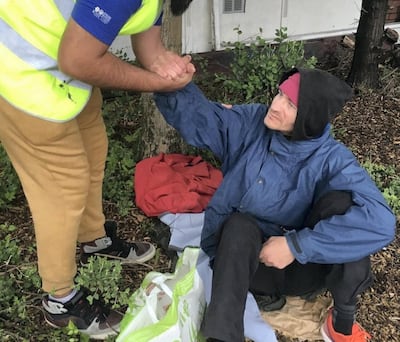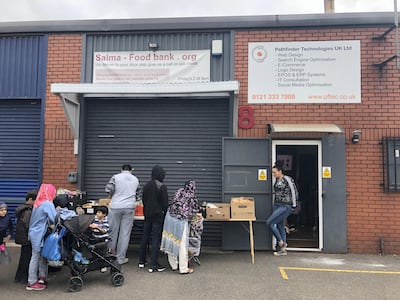Imran Hameed lost his mother 22 years ago when he was just 17 years old. She never let anyone go without food, he remembers, nor would she let someone in need go without help.
She would often go on holiday to Pakistan, not to see her own family but to visit hospitals and listen to patients' concerns. It was in her name, as sadaqah jariyah (a form of giving that extends past a person’s lifetime and helps those in the future), that Hameed set up the UK’s only 24/7 emergency food bank.
He hit upon the inspiration on the 27th night of Ramadan in 2016, commonly known as Laylat Al Qadr, the Night of Power, when it is said that angels descend from heaven and the Quran was first revealed to the Prophet Mohammed some 1,410 years ago. In the three years since his inspired night, Salma Food Bank has delivered 40,000 food parcels to doorsteps and donated 420 tonnes of food in the West Midlands, an area surrounding Birmingham, Britain’s "second city" about 160 kilometres from London.
“I’m a Muslim, and my religion teaches me that I’m not a believer if I don’t feed you when you’re hungry, regardless of who you are. It’s an integral part of my faith. Doesn’t matter if it’s 2 o’clock in the morning, an emergency is an emergency.”
Hameed works on the ethos inspired by a Hadith emblazoned on a banner that greets all outside the Salma Food Bank: “The Prophet Mohammed (peace be upon him) said he is not a Muslim that goes to bed satisfied while his neighbour goes hungry."
But Hameed doesn’t just serve Muslims. About 95 per cent of his food parcel recipients are non-Muslims living in the local area. He has 150 volunteer drivers ready to respond at any given notice 24 hours of the day – and 80 per cent of the food bank’s volunteers are non-Muslim.
Hameed is “proudly British and proudly Muslim”, and is adamant that charity starts at home.
“Allah put us here in Britain and gave us good fortune here for a reason, and thereafter gave us people in need for a reason. He is the bigger planner. I’m all for people giving money away across the world, but look at home first. And for me, home is here in Britain.”
Four million people in Britain live in poverty despite having jobs. In total, 14 million people – a fifth of the population – live in poverty and 1.5 million cannot afford basic essentials.

Food bank use has soared 19 per cent in the past year, with more than 1.6 million three-day emergency food parcels being handed out between April 2018 and March 2019, says food poverty charity the Trussell Trust. Those in need include Muslims fasting for Ramadan.
This is where the Bearded Broz, a humorous name for Hameed's all-hours operation to help the needy, step in. Wearing high-visibility vests and up working when others would be sleeping at noon while fasting, Hameed and his volunteers toil away at packing special Ramadan food parcels containing everything from cooking oil and ghee to chickpeas and flour – the essentials of any iftar.
Packed and ready to go in a van, the Bearded Broz team deliver a round of Ramadan food parcels packed with beans, rice, flour, cooking oil and a bag of rice big enough for a family. Moving around the streets of Birmingham, one drop-off is for a family of seven, asylum seekers from the Middle East, who have a budget of £25 (Dh117) a week and are barred from finding work, with one child paralysed from the waist down.
Minutes later, a parcel is dropped off to a British-Asian single mother on £70 a week. She finds her money is spent on food and commuting, with the only luxury being swimming lessons for her daughter. Another Muslim woman who receives her Ramadan emergency food parcel is thought to be a domestic violence victim.
Hameed and his team are on the front line, often called by police and local authorities as the last resort to tackle social inequality.
He says that many recipients are victims of a revised welfare system, known as universal credit, that has left families and individuals unable to manage on monthly payments that used to be given fortnightly.
“There is more poverty than we think there is and it’s right on our doorstep, whether that be the UAE or Britain," he says.
Ramadan also brings in a greater number of donations to food banks, says Zahra Hussain of London’s Sufra food bank and kitchen.
“We get a lot more people, just individuals coming and donating,” she says. ”We also have a lot more mosques that get in touch with us.”
“They're heightened in their spirituality which means that they want to give more.”
The team at Sufra aren't just passively accepting donations. As part of an ongoing project to assist Syrian refugees resettled in the UK, they are holding a charitable iftar to raise money and help their 80 charges make new friends in the community. The food bank has also devised a downloadable giving calendar to encourage children to donate during the fasting period and their community garden manager, an Irish Catholic, is fasting over Ramadan to raise money for vegetable seeds.
"Integration is a huge issue with the refugees who arrive in England,” says Sufra’s refugee resettlement officer Ibrahim Mohammed.
“Ramadan has always been a good point for [the refugees] to integrate with other people."


